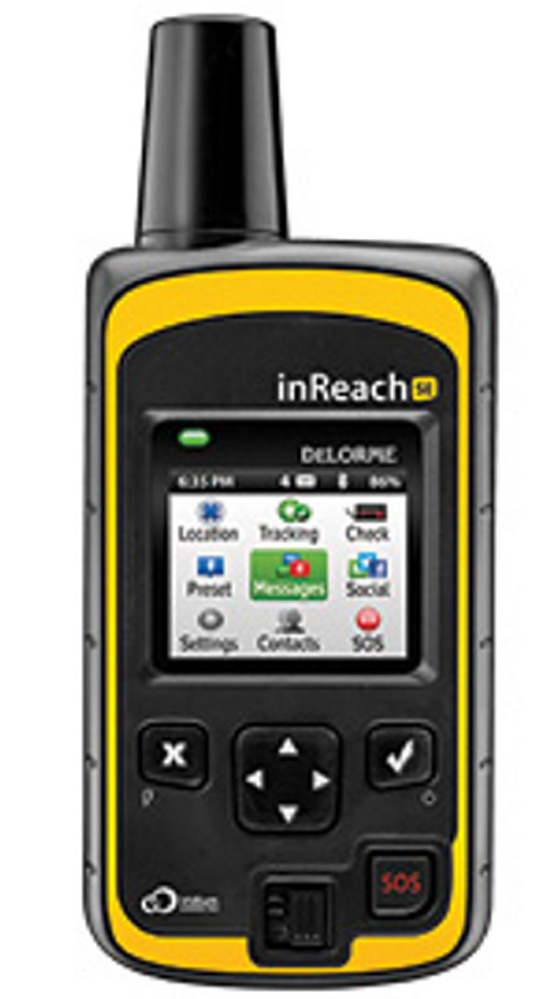A federal appeals court has upheld a $6.2 million civil penalty levied against DeLorme Publishing, the latest development in a patent infringement lawsuit that has dogged the Yarmouth-based navigation company for three years.
But in a move that DeLorme attorney Peter Brann described as “Kafkaesque,” the same court also affirmed a decision by a lower court that the patent held by Virginia-based BriarTek, which filed the infringement claim against DeLorme, is invalid.
It’s “quite stunning,” said Brann, of Brann & Isaacson in Lewiston, of the seemingly contradictory rulings. He said DeLorme, publisher of the famed Maine Atlas & Gazetteer and a developer of mapping software and devices, is considering whether to appeal the ruling issued last week.
The patent ruling is essential to DeLorme’s future. The company has spent several years transforming itself from a provider of primarily paper and digital maps to a navigation technology and satellite tracking company. Its line of two-way emergency satellite communication devices, marketed as inReach and introduced nearly three years ago, now accounts for half of its $20 million annual revenue, DeLorme CEO Michael Heffron told the Portland Press Herald last summer.
Heffron wasn’t available for comment Monday afternoon, said Kim Stiver, DeLorme’s vice president of marketing.
The appeals court’s decision is the latest development in a case that began in August 2012 when BriarTek filed a complaint with the International Trade Commission alleging that DeLorme’s inReach series of hand-held satellite communication devices infringed on BriarTek’s patent for a similar product. BriarTek filed the complaint because, at the time, DeLorme was manufacturing the devices overseas and importing them to the United States.
The trade commission last summer imposed the $6.2 million penalty on DeLorme because it claimed the company violated a consent agreement reached in April 2013 when DeLorme agreed to manufacture its inReach devices in Yarmouth, but not to import or sell in the United States any two-way global satellite communication devices that infringe on BriarTek’s patent. The consent agreement was not an admission of guilt on the part of DeLorme, its attorneys have said.
Soon after the consent agreement was reached, BriarTek argued that the third-party resale of DeLorme’s inReach products in the U.S. and other actions violated the agreement. In March, an ITC administrative law judge found in BriarTek’s favor and recommended a $637,500 penalty. In April, the commission altered the judge’s decision and expanded DeLorme’s exposure, ultimately levying the $6.2 million penalty, which led to the federal appeal.
Meanwhile, a federal district court judge in Virginia ruled last November that BriarTek’s patent was invalid because there were multiple examples of similar products that pre-dated BriarTek’s patent application. BriarTek appealed that decision, which brought both cases before the U.S. Court of Appeals.
The federal appeals court’s decision last week to uphold the penalty while also declaring BriarTek’s patent invalid surprised Brann.
“We thought the International Trade Commission was wrong six ways to Sunday, but then to go ahead and uphold the imposition of a penalty for doing something that could not infringe on this patent because this patent is invalid … it’s preposterous,” Brann said.
Joseph Landa, BriarTek’s CEO, said in a statement Monday that “we will spend the next few days evaluating both decisions, and as always remain confident that eventually this will get resolved.”
Throughout the legal proceedings, DeLorme has continued to manufacture its inReach devices in Yarmouth and market them as emergency communication devices. They are used by people in remote areas without cell phone reception, like sailors and hikers.
Brann said the case is unique because it involves the International Trade Commission, which is normally tasked with pursuing action against companies participating in unfair trade practices. In this case, it is trying to impose itself in a domestic patent infringement matter and targeting a U.S. company that is manufacturing its product here, he said.
Brann described the commission’s civil penalty against DeLorme as “an obvious power grab.” It’s the federal courts that should determine patent infringement lawsuits, not a federal agency that determines the impact of imports on U.S. industries, Brann argued.
“To say that because you have one imported screw in a product made in the United States gives this agency the authority to evaluate patent infringement doesn’t make any sense,” Brann said.
One judge on the federal appeals court’s three-member panel wrote a dissenting opinion, arguing that because the patent is invalid, the case at least should be sent back to the ITC to consider the effect the invalidation has on enforcement of its civil penalty.
If DeLorme loses its case, the penalty would be paid to the ITC, not to BriarTek. That makes Brann wonder about BriarTek’s interest in pursuing the case.
“It doesn’t pay any long-term benefit to them,” Brann said. “It may be vindictive, but it’s been scarcely successful.”
Brann said two appeal options are available: The company could file a petition for a rehearing by all 11 federal appeals court judges, or it could file a petition to have the U.S. Supreme Court consider reviewing the case.
Send questions/comments to the editors.



Success. Please wait for the page to reload. If the page does not reload within 5 seconds, please refresh the page.
Enter your email and password to access comments.
Hi, to comment on stories you must . This profile is in addition to your subscription and website login.
Already have a commenting profile? .
Invalid username/password.
Please check your email to confirm and complete your registration.
Only subscribers are eligible to post comments. Please subscribe or login first for digital access. Here’s why.
Use the form below to reset your password. When you've submitted your account email, we will send an email with a reset code.